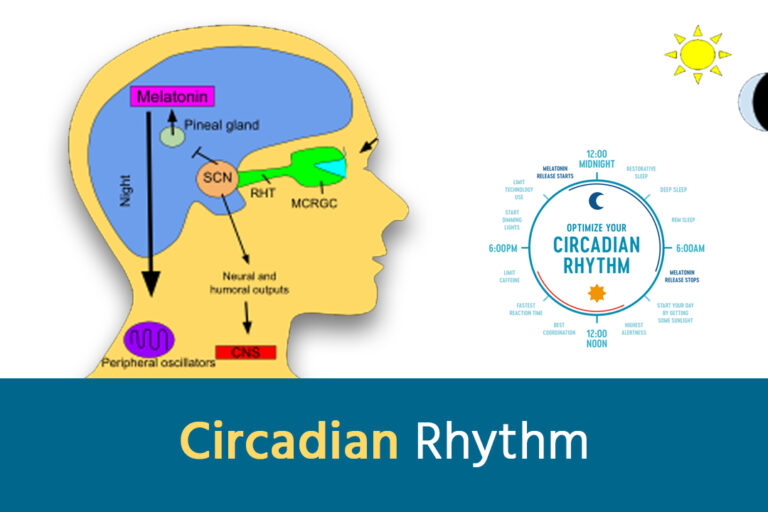Circadian rhythm - Aastha Bariatrics

What are circadian rhythms?
Circadian rhythms are mental, physical, and behavioral changes that follow a 24-hour cycle. These natural procedures respond primarily to light and dark and affect most living things, including animals, plants, and microbes. Study of circadian rhythms is called as Chronobiology.
What are biological clocks?
Biological clocks are organisms’ natural timing devices, it regulates the cycle of circadian rhythms. They are composed of specific molecules of protein. These molecules interact with cells throughout the body. Almost every tissue and organ has a biological clock. Researches have shown similar genes in people, mice, plants, fungi, and many other organisms that make the clocks’ molecular components.
What is the master clock?
A master clock that is in the brain coordinates with all the biological clocks in a living thing. This master clock helps in keeping all the clocks in sync.
Circadian rhythm and Obesity -
The prevalence of obesity continues to increase worldwide. There are multiple risk factors and complex mechanisms involved in the development and maintenance of obesity. Recent researches have shown that the circadian rhythm is important for regulating metabolism because the circadian system modulates energy metabolism and enhances certain energetic activities during day and night. Lifestyle also plays a vital role in impacting the circadian system.
Obese people have high risk for many comorbidities, like insulin resistance, type 2 diabetes mellitus (T2DM), hypertension, and cardiovascular disease. Genetics, poor diet, and no physical exercise are common causes of adverse metabolic health, including obesity and glucose intolerance.
Disturbed sleep and obesity -
Insufficient and disturbed sleep is common in modern society. The American Academy of Sleep Medicine and Sleep Research Society recommends that 7 or more is required each day to maintain optimal health and proper functioning of body.
However, it is still not clear that more than 9 hours of sleep or less than 7 hours are inappropriate. A short sleep period has been indicated to have a relationship with obesity. A meta-analysis of 36 cross-sectional studies showed that a short sleep duration was directly linked with weight gain, particularly in younger age groups. Theoretically, the increased energy expenditure that results from longer periods of wakefulness should cause weight loss, but short sleep generally produces weight gain instead. It has been shown the relationship between short sleep and obesity in humans is caused by increased dietary intake and no physical activity. Many studies have shown a strong relationship between sleep duration and diet. These studies have indicated that a higher fat intake, lower quality diets and irregular eating behavior occur during sleep restriction. Disrupted sleep is now considered as a new and major risk factor for abnormal lifestyle behavior, especially unhealthy eating.
The mechanism of increased food intake during sleep disruption may be varied. Sleep restriction induces changes in appetitive hormones, such as ghrelin, as well as increased hunger Short sleepers generally have reduced leptin, elevated ghrelin and increased weight compared to average sleepers. A functional MRI study also showed increased activation of brain regions that may be sensitive to food stimulation during sleep restriction. It has also been implicated that duration is not the only factor that plays a vital role in obesity; sleep quality has been implicated as well. In a study that included 522 patients with newly diagnosed T2DM, the average number of night awakenings was positively correlated with body mass index (BMI).
There is strong evidence that disrupted circadian rhythm contribute to obesity and metabolic disorders. A short duration and poor quality of sleep are considered risk factors for the development of obesity. The inappropriate circadian timing of food intake is also regarded as a contributing factor for obesity. Greater weight gain and an imbalanced glucose and energy metabolism occur when food intake during the biological night is increased.
Treatment -
When diet and physical activity has failed, Bariatric surgery is the only scientific treatment that can be done to get rid of obesity. We at Aastha Healthcare, Mumbai ensure that the patients undergo a smooth surgery. Regular follow ups are done and diet is prescribed in such a manner that long-term success can be achieved.
Read also; The Cost of Bariatric Surgery in India
Why We Are?
- Asia's Trusted Bariatric Center
- Centre of Excellence
- Patient Trusted Highly Volume Bariatric Center in Mumbai
- EMI, Cashless & Mediclaim Facilities are Available
- Daily Patients Follow-up after Bariatric Surgery
- Patient Support Group Every Month
- Obesity Awareness Program
- Available with Latest Technologies
- 18+ Experience in Weight Loss Bariatric Surgery
- 300+ Weight Loss Diet Plan & Recipes
- Highly Trained & Experienced Bariatric Nutritionist
- Patient WhatsApp Chat Group
- & Many More
Medically reviewed by Dr. Manish Motwani, Bariatric & Metabolic Laparoscopic Bariatric Surgeon — Curated by Ruchika Bachwani






